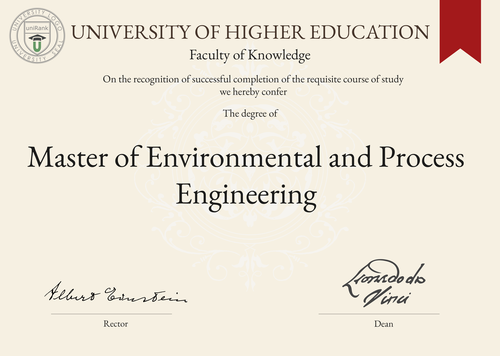
Master of Environmental and Process Engineering (M.E.P.E.)
Guide to Master of Environmental and Process Engineering Program/Course/Degree
Master of Environmental and Process Engineering (M.E.P.E.)

Program Name:
Master of Environmental and Process EngineeringProgram or Degree abbreviation:
M.E.P.E.Duration range:
Varies by country and university, typically 1-2 yearsTuition range:
Varies by country and university, typically $10,000-$30,000 per yearOverview:
The Master of Environmental and Process Engineering program is designed to provide students with advanced knowledge and skills in the field of environmental and process engineering. It focuses on the development and implementation of sustainable solutions for environmental challenges and the optimization of industrial processes.Curriculum Overview by year:
The curriculum is structured to cover both theoretical and practical aspects of environmental and process engineering. In the first year, students typically study core courses such as Environmental Systems Analysis, Process Design and Optimization and Pollution Control Technologies. In the second year, they have the opportunity to specialize in areas such as Water and Wastewater Treatment, Air Pollution Control, or Sustainable Energy Systems.Key Components:
The key components of the program include a strong foundation in engineering principles, hands-on laboratory work, research projects and industry internships. Students also gain expertise in environmental regulations, sustainability practices and advanced engineering software.Career Prospects:
Graduates of the Master of Environmental and Process Engineering program can pursue various career paths in industries such as energy, manufacturing, consulting and government agencies. They can work as environmental engineers, process engineers, sustainability consultants, or research scientists, contributing to the development of sustainable solutions and the protection of the environment.Salary Expectations:
Salary expectations for graduates of the program can vary depending on factors such as the country, industry and level of experience. On average, environmental and process engineers earn a competitive salary, with entry-level positions starting around $60,000 per year and experienced professionals earning over $100,000 per year.Conclusions:
It is important to note that the duration, tuition fees, curriculum, key components, career prospects and salary expectations of the Master of Environmental and Process Engineering program can vary depending on the chosen country or location of study, as well as the chosen university. Prospective students are encouraged to research and compare different programs to find the best fit for their academic and career goals. Visitors can search for where this specific degree, M.E.P.E., is offered anywhere in the world through the uniRank World Universities Search Engine.World Universities Search Engine
search for Master of Environmental and Process Engineering (M.E.P.E.) and add the Location (country, state etc.) or specific University you are interested in studying at.
Query examples:
- Master of Environmental and Process Engineering (M.E.P.E.) United States
- Master of Environmental and Process Engineering (M.E.P.E.) United Kingdom online
- Master of Environmental and Process Engineering (M.E.P.E.) Australia international students
- Master of Environmental and Process Engineering (M.E.P.E.) University of California
- Master of Environmental and Process Engineering (M.E.P.E.) University of London tuition fees
- Master of Environmental and Process Engineering (M.E.P.E.) University of Sydney scholarships
Share Program/Course
Interesting? Share this program/course/degree info with your friends now.